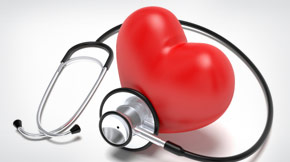Just a little healthy love
With today being Valentines Day, it’s hard not to think about love.
Spending time with that special someone, maybe meeting someone new and falling head over heels (for the first time, or all over again) in L-O-V-E, or finally working up the courage to share your feelings with that person you’ve had a crush on for as long as you can remember.
Love is a joyful state. It’s exciting and really makes people happy. And to top it off, love is healthy.
 Research conducted by German researcher, Prof Dr Tobias Esch and New York based Director of the Neuroscience Research Institute, Dr George B Stefano, found that: “Engaging in joyful activities such as love may activate areas in the brain responsible for emotion, attention, motivation and memory (i.e. limbic structures), and it may further serve to control the autonomic nervous system (i.e. stress reduction).
Research conducted by German researcher, Prof Dr Tobias Esch and New York based Director of the Neuroscience Research Institute, Dr George B Stefano, found that: “Engaging in joyful activities such as love may activate areas in the brain responsible for emotion, attention, motivation and memory (i.e. limbic structures), and it may further serve to control the autonomic nervous system (i.e. stress reduction).
This specific CNS activity pattern appears to exert protective effects, even on the brain itself. Moreover, anxiolytic effects of pleasurable experiences may occur by promotion of an inhibitory tone in specific areas of the brain. Therefore, love and pleasure clearly are capable of stimulating health, wellbeing and (re)productivity.”
Great news, right!
So, how do we actually define love – what is it really?
Poets, philosophers, writers and artists have tried to understand and explain love for centuries.
Some of the most ancient texts that exist are tales of deep emotions, yearning or simply just writings about love.
One of the most intriguing things about love writings is that they exist across all cultures.
We can look at the ancient Greeks and read the words of Homer, or drift across to India and discover some of the ancient Hindi texts describing love. Then head to Ireland and the land was filled with tales of love.
And if we consider modern writings, including songs, plays, poems, television scripts, movie scripts, fiction and even biography, we discover love recreated throughout.
We ‘love’ love.
Science has more recently started to research what love is, in an attempt to understand and explain it.
Einstein, one of the world’s greatest minds, is quoted on science and love, citing “How on earth are you ever going to explain in terms of chemistry and physics, so important a biological phenomenon as first love?”
So is it possible to explain love?
Well, there are many chemical reactions that researchers have identified as part of the “cycle” of love, starting with attraction.
Research shows falling in love activates a stress response in people. Adrenaline activates sweat hormones, dry mouth and higher blood levels. So next time someone gets all sweaty and clammy in your presence, take it as a compliment, they might just be falling in love with you!
Dopamine levels increase during the love cycle, stimulating the desire and reward triggers in the brain, and can lead to a serious pleasure rush.
And if you find yourself continously thinking about the person you’ve fallen head over heels for, scientists explain this is due to a serotonin response – a chemical reaction that keeps the one you love top-of-mind.
This Valentine’s Day, remember that being in love isn’t just about fun, but it’s also good for you, even healthy! Being nervous or scared to fall in love is okay, they’re just chemical reactions in your brain. Well maybe a little more than just chemical reactions!
“You won’t find faith or hope down a telescope
You won’t find heart and soul in the stars
You can break everything down to chemicals
But you can’t explain a love like ours.”
– The Script, Science and Faith
